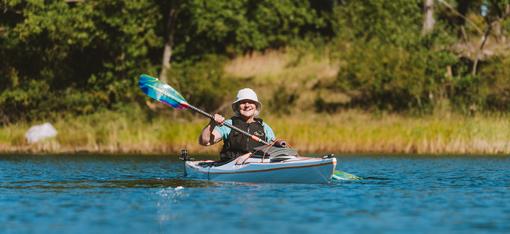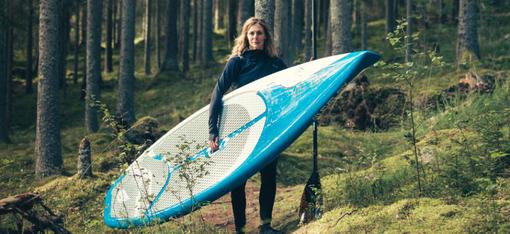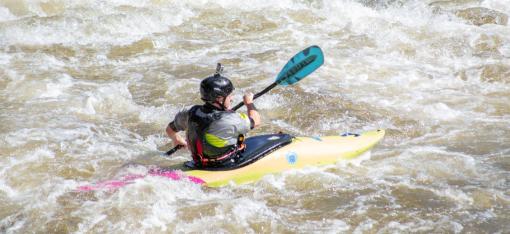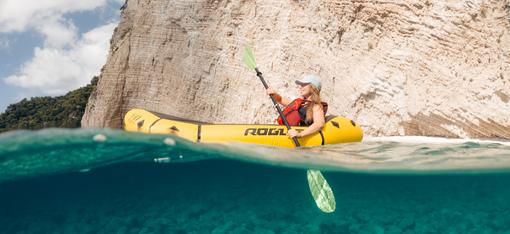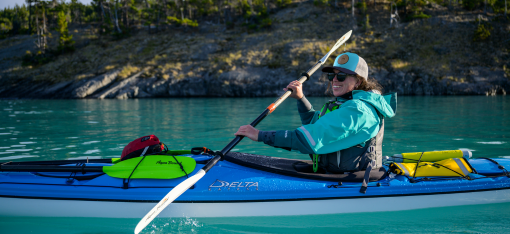How Safe is Whitewater Kayaking?
4-minute read + 9-minute video
Whitewater kayaking is often seen as dangerous. But is it? As Ken Whiting, a 30-year veteran of whitewater kayaking, says: “Whitewater kayaking really is no different than any other outdoor adventure sport. It can be safe…it can also be dangerous. It depends on so many factors.”

To help us dive into those factors, Ken and Paddle TV released this video:
The Key to Whitewater Kayaking Safety
The most important factor in safe whitewater kayaking is appropriate instruction.
Ken likens it to learning to drive a car. There’s a reason every driver is required to have instruction and pass a test! With that instruction and plenty of practice, driving is relatively safe (probably not as safe as whitewater kayaking, though, says Ken!).
A multi-day whitewater course with a certified instructor is, hands-down, the key to safe whitewater kayaking. Ken recommends a five-day course as the best of the best for a great foundation for skills and safety.
How to Minimize the Risk of Whitewater
Because moving water is involved, if you capsize, things keep happening. The water continues to move, and you move with it. It’s that unknown that can cause both anxiety and, yes, risk.
When you take the proper precautions, though, you can minimize that risk significantly:
- Lay the proper foundation through good instruction and practice through the levels of difficulty. Start with smaller rapids and move up as your skill and confidence increase. Don’t push your limits in water above your ability level.
- Be aware of water levels at any river you plan to kayak. Is it early spring? Have there been recent heavy rains that may mean bigger rapids or faster water than you can handle?
- Kayak in warm waters rather than glacier-fed mountain rivers. That greatly reduces or eliminates the danger of hypothermia if you happen to end up in the water.
- Wear the right gear: life jacket, helmet, wet or dry suit (depending on water temps). Dress for the swim.
- Choose rivers with “pool drops” rather than rivers with continuous rapids. That way you have the challenge of rapids, then a recovery time if you need it to collect your wits and any gear you may have lost, should a capsize occurs.
- Paddle with the right people—those who understand and practice good safety measures, too.
- Don’t whitewater kayak alone. If you do end up in an emergency situation, you’ll have someone to help you, or at the very least, get help.
- Don’t mix whitewater kayaking with alcohol or drugs. That’s just a bad idea.

By the way, everything we’re saying here is also true for whitewater packrafting, canoeing and standup paddle boarding.
The Bottom Line
Ken is convinced that “choosing the right environment with the right instruction, and pacing yourself and your growth, you can [whitewater kayak] in a very safe way.”
Ken brings up another point: What are the risks if you don’t whitewater kayak? We can ask that about any activity that has the potential to add tremendous value to your life.
In his case, his 30 years of whitewater has “shaped the person I am today. It’s had a profound impact on the incredible friends I have around the world…my wife…the places I’ve gotten to see.” He obviously can’t imagine his life without it!
In most of life’s rewarding pursuits there’s some risk involved. That’s definitely true of outdoor adventure sports, like whitewater kayaking. There’s environment, gear, weather, companions—all can either increase or decrease that risk.
We believe, with Ken, that it’s worth it to prepare for, mitigate and face those risks to get the rewards of the activity!
Where to Find a Local Whitewater Kayaking Course
The easiest way to find a whitewater kayak course from a certified instructor is to go to the American Canoe Association’s website. Their Education page has many links to course options in various locations. You’ll want to search through their "River Kayaking" courses.
You can also do a local online search, or contact a local paddlesports shop. Many of these shops offer courses themselves, or if not, can point you towards those who do.
Once you’ve taken a multi-day course, a super way to practice with others is to join a whitewater club. Again, do an online search for “local whitewater kayak club” to find either a website or a Facebook group.

NRS, a respected name in paddlesports, has dozens of articles on safety for whitewater kayakers if you’d like to dig in more.
(All photos courtesy of Heliconia)
Do you have paddle questions our friendly Customer Service Team can help you with today? Contact them: 715-755-3405 • sales@aquabound.com
More for you...

